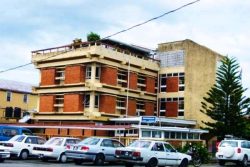Government will continuously pursue strengthening areas of the 2016 Stabroek Block Production Sharing Agreement (PSA) that allow wiggle room to do so, but it has ruled out a formal renegotiation process.
“In relation to the strengthening of the whole agreement, we have committed to ensuring we maximise the benefits; that we ensure that wherever there are areas that we can potentially relook at to maximise our benefits, those areas will be looked at,” President Irfaan Ali responded when asked by Stabroek News about the possibility of renegotiation nine months into his term.
“There was no commitment to renegotiate in the (PPP/C) manifesto. We said we will relook at this to see the grey areas that we can maximise our benefits. But for the future agreements, I have made it clear, every aspect will be shared and the public will be kept informed,” he told a press conference at State House.
Ali reiterated positions taken by his government that when it crafts agreements for the remaining oil blocks, it will ensure that maximum gains are had.
ExxonMobil had last year hinted that it was willing to discuss with government the local content areas it can give more to, but drew the line at any renegotiation of the controversial 2016 PSA crafted with the APNU+AFC government. Local content programmes, however can be deducted from cost oil.
“Contract sanctity is a fundamental principle of doing business worldwide, particularly in the oil and gas industry, to allow for certainty when making significant, long-term investments. The Government of Guyana has indicated that it will not renegotiate but will review the agreement,” President of ExxonMobil Guyana, Alistair Routledge had told Stabroek News, weeks after Ali was sworn in.
Retain some
Meanwhile, the President also announced that while his administration will auction all other remaining oil blocks, an area being examined was to see if this country should keep some of those blocks and develop them itself.
“We have made it very clear, the process in awarding new oil blocks will be very much different. It will be an open process and when we get to that stage it will be a public open bidding process. We will be looking for the best offer, in an open public way,” Ali informed.
“Unless of course, and we are still looking at… discussions are still ongoing. It calls for a lot of technical analysis on whether Guyana itself can retain some of those blocks for our own development and to manage by ourselves. That [discussion] is very preliminary,” he added.
In giving an overview of the oil and gas sector here, the President underscored that funds will be used in a diversified way to develop other sectors, especially this country’s human resources.
Echoing positions by Vice President Bharrat Jagdeo on Monday that local content must be felt in a tangible way by all Guyanese, Ali said that government was working to ensure this.
Announcing positions and services for which vacancies will soon be advertised, Jagdeo had said that government is moving to boost its capacity for oversight of the operations of ExxonMobil and pointed out that there are questions about the oil major’s spending and whether the country is getting value for money.
“You cannot tell me that a company from out of Guyana will come here and provide brokerage services in Guyana. What nonsense! That will not be tolerated. It cannot be accepted,” the President yesterday contended. “There has to be a frank discourse,” he emphasised.
“The oil companies must make it very clear what are the requirements for every services required… together we build the system to fill the gap so we meet that requirement in the shortest possible time. If they are keen on the development of the country… they must also must be keen in providing (operations) for that country,” he added but noted that citizens have to be realistic in expectations. “We must be real… there are things that we too cannot do.”
Calling on the private sector to do its part in galvanising support from locals to get into businesses and those already there to forge allegiances and to be more competitive, the president said that Guyanese must understand that “fighting” each other would not help either side.
We have a history of family-owned businesses. We are not fighting each other locally. [We must ask] How do we come together to compete? How do we build consortiums? How do we build partnerships? We can’t be satisfied with being only associates of a company coming from overseas and be happy that your company individually getting a little benefit. How are we going after the big opportunities?
He said that government is “going to give all the support” that locals need to compete but they in turn would have to continue the cycle by assisting each other as there are more than enough opportunities here for all to partake.
For the foreign companies coming in, Ali said that they have to remember not only their corporate social responsibility, but be willing to help the country they are investing in to develop its human resource potential.
And with more than US$300 million in revenue and royalties since production began in December 2019, Ali said that for this year, those monies would not be touched until the PPP/C completes its macro-development plan, scheduled for later in 2021.
But he maintained that when it is spent, it will be linked to something broader ”…to strengthen and open new opportunities… and tackling poverty.”
“We have to ensure that there is equity and no widening between those who have and those that don’t have. The resources have to be used to close that gap. Health care, education, food security, housing, all those are areas in closing that gap,” he said.
“We have a number of things that we have to do; in terms of setting up the Petroleum Commission. We also have to look at the legislation for the Sovereign Wealth Fund. But at this moment, we are not looking at the oil revenue to meet government expenditure; at this moment. Later this year when the macro development plan will be made, in terms of the development, that will take place,” he assured.








